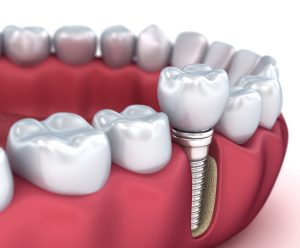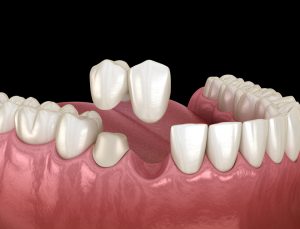Please note we may not offer this service at our office. Contact (970) 669-3918 to learn more.
What Are Endosteal Dental Implants?
Endosteal dental implants are tooth restorations placed directly in the jawbone. Typically made of titanium, they’re the most common type of implant used for replacing teeth. Endosteal implants mimic the shape of a natural tooth root as they’re placed into the jaw, creating a secure foundation for a permanent restoration, such as a dental crown, to be placed on top of the titanium implant.
There are multiple dental implant treatment options available with endosteal implants, including implant-supported dentures, single-tooth replacements, and more. Call our Loveland, CO dentist, Dr. Howard, today at (970) 669-3918 to learn more about the implant treatments we offer at our dental practice.
Advantages of an Endosteal Dental Implant
An endosteal implant provides various advantages, including:
- Long-lasting solution: With proper care, an endosteal implant can last a lifetime.
- Natural look and function: You won’t have to worry about slipping or sliding around, as endosteal implants are secure in the jaw and provide a natural appearance.
- High success rates: While there’s always a small risk with any surgical procedure, endosteal implants have a success rate of around 95%.
- Preservation of the jawbone: By replacing a missing tooth, patients won’t have to worry about jawbone deterioration and will have a healthy bone structure.
- Improved oral health: When a lost tooth goes unreplaced, surrounding teeth can shift and create poor oral health. With a full smile, patients can achieve good oral health for years.
- Easy maintenance: There are no special instructions for endosteal implants. Simply care for them just as you would your natural teeth.
How do Endosteal Implants Work?
Endosteal implants work by replacing the missing tooth root. During the endosteal implant procedure, a small titanium post is surgically placed into the jawbone by an oral surgeon. The implant is left to heal and fuse with the bone, a natural process known as osseointegration. Once the implant has fused with the jawbone, the dental surgeon attaches an artificial tooth to the metal post. While the entire procedure is completed in one visit, the recovery period varies between three and six months.
Patients will achieve a beautiful, complete smile that functions just like their natural teeth.
Do You Qualify for an Endosteal Dental Implant?
Your candidacy for endosteal dental implants can be determined by your oral surgeon or dentist. To be a good candidate for endosteal implants, you need adequate jawbone density and must be in good overall health. Patients with chronic illnesses, such as diabetes, or those who smoke or use tobacco products may not be candidates as it increases their chances of implant failure.
Endosteal dental implants aren’t recommended for patients with severe bone loss. For those cases, your dentist may consider other tooth replacement options or a supplemental procedure, such as bone grafting or a sinus lift.
Ideal candidates for endosteal implants meet the following criteria:
- Excellent oral and general health
- Healthy gum tissue
- Fully grown jawbone and enough bone in the jaw
- Can maintain a pristine at-home oral hygiene routine
- Visits the dentist twice a year for checkups and dental cleanings
Endosteal Implant Alternatives
While an endosteal implant is the most popular type, there are other alternative implants and tooth replacement options. A dental professional may recommend any of the following alternatives:
- Zygomatic Implants: These are longer than an endosteal implant and are anchored into the cheekbone rather than the jawbone. They’re suitable for patients with severe bone loss in the upper jaw.
- Subperiosteal Implants: These implants are placed on the jawbone but beneath the gum tissue. Subperiosteal implants are suitable for patients who have lost a significant amount of bone density in their jaw, and they’re unable to support an endosteal implant.
- Removable Dentures: These are a non-surgical option for patients who have lost several teeth or all of their teeth. Dentures can be removed for cleaning and maintenance.

- Dental Bridge: A prosthetic device that replaces one or more missing teeth by attaching to the surrounding natural teeth on either side of the gap.
To determine the best tooth replacement option, your dentist or oral surgeon will evaluate your dental health and discuss your smile goals. If you’re in Loveland, CO, contact our dentist today to schedule your implant consultation.
Frequently Asked Questions
While the surgical procedure for endosteal dental implants only takes one visit to the dentist, the entire endosteal implant process typically takes several months to complete. The implant will naturally fuse with the jawbone before the permanent restoration can be placed on top of the metal posts.
Patients can expect the entire treatment to last between three and nine months. However, some patients may need to undergo additional surgery, such as bone augmentation, to create the solid base needed for the implant body.
Endosteal dental implant surgery typically causes minimal pain as only a small incision is needed. The procedure is also usually done with some type of dental sedation. After the procedure, patients may experience some discomfort and swelling, but they can manage this discomfort with over-the-counter pain medications and cold compresses.
Endosteal dental implants can last a lifetime with proper aftercare and oral hygiene. To increase their longevity, make sure you’re maintaining good oral hygiene, visiting the dentist for regular dental check-ups, and avoiding habits such as smoking or grinding your teeth.
Yes, endosteal dental implants can replace multiple missing teeth by placing several implants into the jawbone. Typically, these treatments are known as implant-supported dentures or implant-supported bridges. Your treatment is custom-designed to meet your needs.
Fill the Gaps in Your Smile By Scheduling an Appointment
Endosteal dental implants are a highly effective and long-lasting solution for replacing missing teeth. Not only do they look and function like natural teeth, but they also help preserve the integrity of the jawbone and prevent surrounding teeth from shifting.
Say goodbye to dental concerns and hello to a confident, radiant smile. Call our office at (970) 669-3918 to schedule your consultation. We welcome patients from Evans, Campion, and Garden City.
